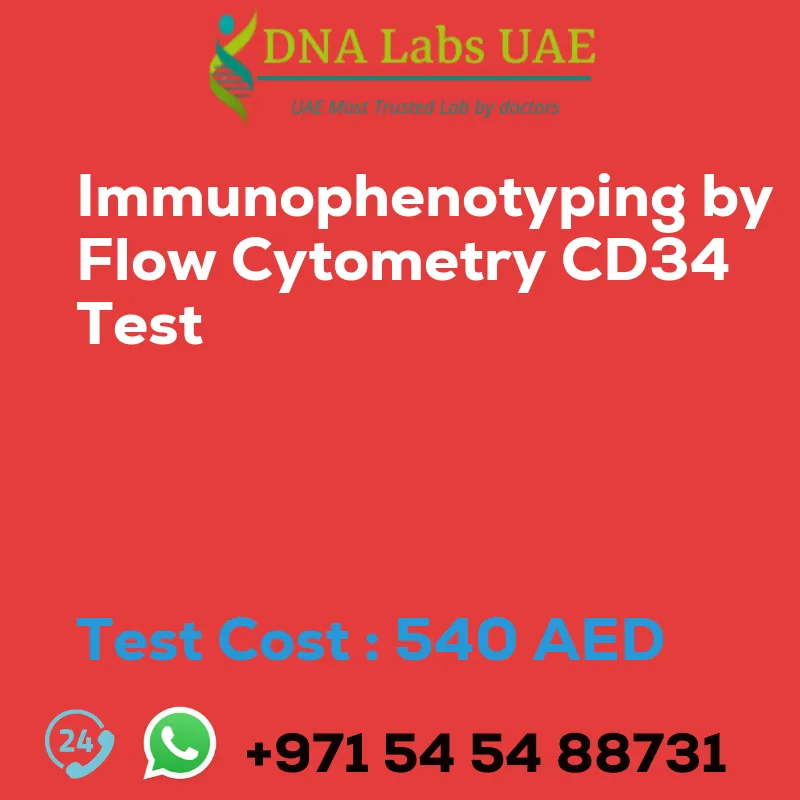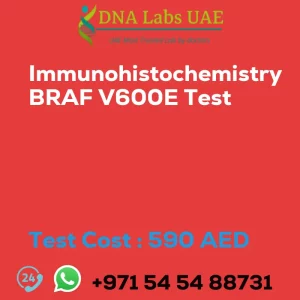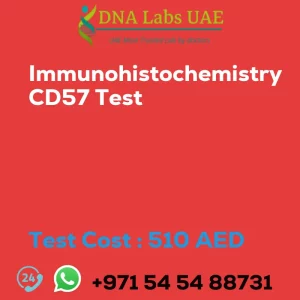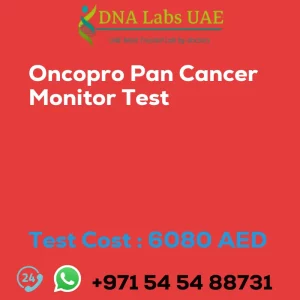IMMUNOPHENOTYPING BY FLOW CYTOMETRY CD34 Test
Test Name: IMMUNOPHENOTYPING BY FLOW CYTOMETRY CD34 Test
Components: CD34 Test
Price: 540.0 AED
Sample Condition: 3 mL (2 mL min.) whole blood in 1 Lavender Top (EDTA) tube and 3 mL (2 mL min.) whole blood in 1 Green Top (Sodium Heparin) tube OR 2 mL (1 mL min.) Bone marrow in 1 Green Top (Sodium heparin) tube. Ship immediately at 18-22°C. DO NOT REFRIGERATE OR FREEZE. Specify time, date, and clinical details on the test request form.
Report Delivery: Sample Daily by 9 am; Report Same day
Method: Flow Cytometry
Test Type: Cancer
Doctor: Oncologist, Hematologist
Test Department: FLOW CYTOMETRY
Pre Test Information: Give brief clinical history.
Test Details:
CD34 is a protein that is expressed on the surface of hematopoietic stem cells and progenitor cells. Immunophenotyping by flow cytometry is a technique used to identify and quantify different cell populations based on the expression of specific cell surface markers, such as CD34. The CD34 test is commonly used in clinical settings to evaluate the presence and quantity of hematopoietic stem cells in a sample. This test can be used to assess the effectiveness of stem cell transplantation, monitor the progression of certain blood disorders, and aid in the diagnosis of leukemia.
During the CD34 test, a sample of blood or bone marrow is collected from the patient. The cells in the sample are then stained with fluorescently labeled antibodies that specifically bind to CD34. The stained cells are then analyzed using a flow cytometer, which is a specialized instrument that can detect and quantify the fluorescence emitted by each individual cell. Based on the fluorescence intensity, the flow cytometer can determine the percentage of cells expressing CD34 and provide information about the overall distribution of CD34-positive cells.
The results of the CD34 test can help clinicians make informed decisions regarding the treatment and management of various hematological conditions. It provides valuable information about the quantity and quality of hematopoietic stem cells, which are crucial for maintaining a healthy blood system.
| Test Name | IMMUNOPHENOTYPING BY FLOW CYTOMETRY CD34 Test |
|---|---|
| Components | |
| Price | 540.0 AED |
| Sample Condition | 3 mL (2 mL min.) whole blood in 1 Lavender Top (EDTA) tubeAND 3 mL (2 mL min.) whole blood in 1 Green Top (Sodium Heparin) tube OR 2 mL (1 mL min.) Bone marrow in 1 Green Top (Sodium heparin) tube. Ship immediately at 18\u0192??22?\u00f8C. DO NOT REFRIGERATE OR FREEZE. Specify time, date and clinical details on test request form. |
| Report Delivery | Sample Daily by 9 am; Report Same day |
| Method | Flow Cytometry |
| Test type | Cancer |
| Doctor | Oncologist, Hematologist |
| Test Department: | FLOW CYTOMETRY |
| Pre Test Information | Give brief clinical history. |
| Test Details |
CD34 is a protein that is expressed on the surface of hematopoietic stem cells and progenitor cells. Immunophenotyping by flow cytometry is a technique used to identify and quantify different cell populations based on the expression of specific cell surface markers, such as CD34. The CD34 test is commonly used in clinical settings to evaluate the presence and quantity of hematopoietic stem cells in a sample. This test can be used to assess the effectiveness of stem cell transplantation, monitor the progression of certain blood disorders, and aid in the diagnosis of leukemia. During the CD34 test, a sample of blood or bone marrow is collected from the patient. The cells in the sample are then stained with fluorescently labeled antibodies that specifically bind to CD34. The stained cells are then analyzed using a flow cytometer, which is a specialized instrument that can detect and quantify the fluorescence emitted by each individual cell. Based on the fluorescence intensity, the flow cytometer can determine the percentage of cells expressing CD34 and provide information about the overall distribution of CD34-positive cells. The results of the CD34 test can help clinicians make informed decisions regarding the treatment and management of various hematological conditions. It provides valuable information about the quantity and quality of hematopoietic stem cells, which are crucial for maintaining a healthy blood system. |








